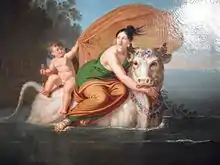Giuseppe Patania
Giuseppe Patania (January 18, 1780 – February 23, 1852) was an Italian painter of the Neoclassical period. He painted portraits and historical subjects.
Giuseppe Patania | |
|---|---|
 Self-portrait on display at Galleria d'Arte Moderna Palermo | |
| Born | 18 January 1780 Palermo, Italy |
| Died | 23 February 1852 (aged 72) Palermo, Italy |
| Nationality | Italian |
| Known for | Painter |
| Movement | Neoclassicism |
Biography
He was born in Palermo, Sicily. He studied with Giuseppe Velasco and Vincenzo Riolo.[1] He is buried in San Domenico in Palermo, where his tomb states Selected the beautiful from Nature.[2] Among his pupils were Pietro Marchese di Castrogiovanni,[3] Giuseppe Bagnasco,[4] Francesco Sacco,[5] Giuseppe Carta,[6] Andrea D'Antoni and Pietro Volpes.
In his biography of Andrea D'Antoni, the author Carmelo Pardi surveyed the art of the early prior century in Palermo, and observed that it was dominated by Velasco (Velasques), Riolo, and Patania. While all three gained local eminence, none had all the required skills to form a true school of followers: Velasques, master of design but poor colorist; Riolo, while Michelagelesque in his grand paintings, restricted himself to academic subjects and molded many of his images in imitation of classic statuary; while Patania, full of natural instincts, completed genre works with delicate grace, but failed in large compositions depicting great and severe arguments.[7] Thus to summarize:[8]
in Velasquez, the perfection of design surpassed the color; in Riolo the conventionality of the form prevailed to the study of the true, and in the Patania the natural spontaneity took precedence to the knowledge of the principles that inform art.
Gallery
 Roger of Sicily Receiving the Keys of Palermo
Roger of Sicily Receiving the Keys of Palermo Ratto d'Europa (1828-1829). Galleria d’Arte Moderna (Palermo)
Ratto d'Europa (1828-1829). Galleria d’Arte Moderna (Palermo)
References
- "Galleria Roma". website, entry on painter. Archived from the original on July 14, 2013. Retrieved January 2, 2016.
- G. Dennis (1864). A handbook for travellers in Sicily. John Murray. p. 43. Retrieved January 2, 2016.
- Memorie su la Sicilia, volume 3, by Guglielmo Capozzo (1842), Page 137.
- G Capozzo, page 138.
- G Capozzo, page 138.
- G Capozzo, page 139.
- Della vita e delle opere di Andrea D'Antoni pittore, by Carmelo Pardi, 1869, Tipografia del Giornale di Sicilia, Palermo, pages 6-7.
- in Velasques la perfezione del disegno soprastava al colorito; nel Riolo la convenzionalità della forma prevaleva allo studio del vero, e nel Patania la spontaneità naturale la vinceva sulla conoscenza de’ principii informatori dell’arte. (page 7)